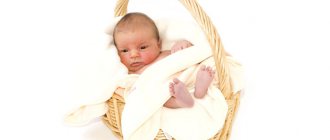After giving birth, a young mother often does not know how to behave with her newborn baby. Patronage is designed to help her feel confident and raise a healthy and developed child.
- A young woman who is preparing to become a mother for the first time feels the burden of responsibility for her baby. She realizes how fragile he will be and is afraid that she could harm him with her inept actions.
- The expectant mother sometimes feels like she is left alone with this responsibility. But that's not true
- Even during pregnancy, a local pediatrician and a nurse appear next to her, whose task is patronage of newborns and children in the first year of life, which includes not only monitoring the baby’s health, but also psychological support for the mother
What is nursing care for a newborn? Goals of newborn care
The term “patronage” is literally translated from French as “patronage” (patronaqe). In medicine, it means a set of activities carried out by a doctor or nurse at the patient’s home, the tasks of which are to treat the patient, prevent him from various diseases, as well as educate him.
On the first to third day of your stay, a pediatrician will come home to the newborn.
IMPORTANT: One of the most important tasks of public medicine (and medicine in general) is raising healthy, strong children with strong immune systems. Local doctors and nurses must not only treat young patients, but also take all possible measures to prevent them from possible diseases and developmental disorders
It is important for the staff of the children's clinic to carry out timely primary prevention of various types of diseases and developmental disorders in children, which consists of the following measures:
- medical
- psychological
- pedagogical
During visits as part of prenatal care, as well as patronage for newborns, the nurse must identify and prevent unfavorable environmental factors (internal and external) that can negatively affect the health and normal development of the baby who has just been born.
IMPORTANT: A woman’s first acquaintance with the staff of a children’s clinic occurs during her pregnancy. The first time a pediatric nurse visits her immediately after registering with the antenatal clinic in order to assess the conditions under which the pregnancy will proceed and the child will be born, as well as give the pregnant woman some recommendations.
Later, in the middle of the third trimester, the nurse will come again to check that her recommendations have been followed. She will advise the expectant mother on issues of caring for the newborn, breastfeeding, and organizing the postpartum period in general.
Patronage is not only a medical intervention, it also aims to support a young mother and help her learn how to care for a newborn.
- The medical institution informs the maternity hospital that a newborn patient has appeared in the territory served by a certain children's clinic.
- On the first or third day after the mother and baby are discharged, a local pediatrician and a visiting nurse should make a joint visit to their home. This visit is called the first pediatric visit to the newborn.
- It is noteworthy that in addition to the fact that the initial patronage must be carried out on time, it is assumed to be solemn
- The doctor and nurse should never play the role of strict teachers or supervisors. A young mother, who is then under physical and psychological stress, should under no circumstances be poked at her mistakes, if any.
- The staff of the children's clinic must demonstrate friendliness and willingness to help the woman in any questions regarding the newborn, its health, development and everyday life
The goals of primary care for a newborn are:
- assistance to a woman during the postpartum period, advice on caring for a newborn
- consultations regarding the organization of a newborn’s regimen
- assistance in organizing and establishing feeding of a newborn
- assistance in breastfeeding
- prevention of common childhood diseases (rickets, anemia, others), including infectious ones
- assessment of the child’s health and development, monitoring them
- consultations regarding preventive examinations of a child up to one year old by a pediatrician and medical specialists, his vaccination
Tasks of the visiting nurse for newborns
1. Monitoring the baby’s health:
- general external examination of the child’s body - a specialist palpates the abdomen, assesses the symmetry of the arrangement of organs and body parts, the degree of development of the genitals, the shape of the head, palpates the fontanel;
- the newborn’s reflexes are assessed: grasping, motor;
- skin, sclera, oral mucosa - the nurse examines the skin for diaper rash, rashes, and other injuries, assesses the color of the skin and sclera, oral mucosa, and examines the throat;
- umbilical wound - the nurse examines the wound, shows and tells the mother how to treat it.
If the visiting nurse discovers any discrepancy in the child's development, she should immediately inform the pediatrician. In the presence of pathologies, only a doctor can give all recommendations to young parents.
2. Assessment of the child’s social and living conditions:
- the baby must have a separate bed;
- diapers and all necessary clothing must be washed and ironed in a timely manner;
- the apartment must be kept clean and regularly ventilated.
If the baby is kept in unsatisfactory conditions or there is a threat to his life and health, the visiting nurse immediately transmits this information to the guardianship authorities.
3. Assessing the emotional state and health of the mother:
- a visiting nurse can examine the mother’s mammary glands, talk about nipple care, the frequency of feedings, and teach how to properly attach the baby to the breast;
- if a lack of milk is detected, the health visitor can write free prescriptions for formula and recommend baby food;
- talk about the mother’s diet and daily routine, remind her of the need for rest and proper sleep.
4. Collecting information in order to determine the risk of developing certain diseases: the nurse will talk with the mother about how the pregnancy, childbirth proceeded, and about hereditary diseases in the family.
5. Consultation: the nurse must answer all the young parents’ questions within their competence:
- walks - inform about their necessity, duration and frequency, under what weather conditions it is better to stay at home;
- baby’s clothing – teach how to properly dress a baby depending on external conditions in order to avoid overheating or hypothermia;
- baby's toilet - show how to clean the nose, wash it, give recommendations on the choice of cosmetics for caring for the skin of a newborn;
- bathing - talk about the temperature of the water, the duration of bathing, and, if necessary, help parents bathe the baby for the first time;
- baby's routine - how long the baby can stay awake and sleep, show how to rock to sleep, give recommendations for putting the baby to sleep at night, talk about the correct position of the baby in the crib to avoid asphyxia;
- external conditions - talk about the optimal air temperature in the room, how often the room needs to be ventilated;
- about solving possible problems: colic, constipation, hiccups, regurgitation, what to pay attention to if the child cries and cannot calm down;
- massage - when you can start a massage for the baby, give recommendations and show how to do it correctly.
Newborn care form and sample filling
Patronage form for a newborn: part 1.
Patronage form for a newborn: part 2.
Patronage form for a newborn: part 3.
Timing of newborn care. How many times does newborn care take place?
The duration of a newborn's patronage and the frequency of visits by a pediatrician and nurse depend on the state of his health and conditions in the family. If the baby develops normally, is healthy and grows in a favorable atmosphere, visits from the staff of the children's clinic are carried out in the following way:
- first visit – 1-3 days after discharge from the maternity hospital
- second visit - 10 days after discharge from the hospital
- further up to a month – 1 time per week
- further up to 6 months – 2 times a month
- further up to 1 year – 1 time per month
- from 1 year to 3 years – once every 3 months
IMPORTANT: According to indications, patronage of a child under one year is carried out more often
An example of nursing care for a newborn
Nursing care can occur in different sequences and in different atmospheres. But there are some general principles. So, nurse:
- Clarifies the features of pregnancy and childbirth. She studies the newborn’s documents issued at the maternity hospital, creates and fills out a child’s card
- Examines the child. She assesses the condition of his umbilical wound, checks his fontanelle, weighs the baby if necessary, measures his height, chest and head volumes. The baby’s skin and mucous membranes are also examined.
- Assesses his neuropsychological state. She records the presence of certain reflexes in the baby and evaluates the work of his analyzers. So, at 10 days it is noted whether the child can keep a moving object in his field of vision, at 20 days - to fix his gaze on a stationary object, at 1 - 3 months - to raise and hold his head in a position on his stomach, etc. Gives recommendations regarding the treatment of the umbilical wound. Recommends visiting certain specialist doctors, if there are indications for this. Shows how to give infant massage and gymnastics
- Assess living conditions and emotional atmosphere in the family. Provides recommendations for improving the living conditions of the newborn
- Specifies the type of feeding of the child. If it is breastfeeding, examines the mother’s breast, evaluates the correctness of the latch, gives recommendations regarding feeding regimen, breast hygiene, nutrition of the nursing mother, etc. If the child is formula-fed, explains the formula feeding scheme, feeding hygiene, etc.
- Teaches a woman the specifics of toileting her baby, treating his ears, nose, and eyes. Tells how to bathe a child. Recommends products and cosmetics for the care of infants
- Tells how to do a manicure for a baby
The health visitor must teach the mother how to care for the newborn.
IMPORTANT: A nurse is not just a lecturer. She shows various manipulations with an infant and invites the mother to carry them out independently, but under her control
Tasks and goals of patronage
- Examination of a newborn involves: assessment of the size of the large fontanelle, palpation of the abdomen, condition of the skin and mucous membranes. The last manipulation is carried out to eliminate the likelihood of thrush developing in the mouth of a newborn. If necessary, a medical professional can not only assess the condition, but also treat the umbilical wound. In this case, you will need peroxide, cotton swabs, sponges and brilliant green or calendula tincture. Depending on the condition of the wound, you will be advised how often you should carry out this manipulation yourself in the future. The doctor can also listen to the baby's heart and pay attention to his crying and breathing. In addition, experts clarify how he eats, what type of feeding the mother chose - breast milk or artificial formula, and give their recommendations on the chosen type.
- Here we will talk more about the young mother, since the nurse or doctor must conduct a survey of the young mother. In addition to the “required” questionnaire, the doctor or nurse communicates with the mother regarding her somatic and mental health. They find out if the family has any questions or worries about the baby’s arrival. In addition, the medical staff finds out the state of lactation; it also happens that by the time of the first visit the milk has not yet appeared or there is very little of it, in which case they will tell you how to increase lactation. A very important issue that also requires the help of a specialist is nutrition during breastfeeding. Despite the fact that such stereotypes as that a mother should not eat anything other than buckwheat and water are long gone, you will still have to follow a certain diet during this period. You will also be told what your daily diet should include during the primary care of the newborn.
- During the first visit, medical staff are also required to assess socio-economic conditions. Here, most likely, we will include the question of whether this baby was wanted and in what conditions he will have to live, whether this family requires the help of social services.
- Mother training. Surely, a young mother may have several questions regarding feeding her baby - perhaps you are unable to organize this process, bathing the baby, cutting nails. Strabismus, souring or other problems with the organs of vision may be alarming. It is important to learn how to properly clean your ears and nose. In the end, the issues of sleep and stool of the newborn will not be left aside. In addition, when caring for a child, especially in the first days, special cosmetics are needed: mild soap, oil or skin care cream. Your doctor can also recommend all the necessary remedies. Many doctors have nothing against light exercise for the baby, but in the first weeks of life all movements come down to stroking. Think ahead and make your list of questions that you want to clarify. In the first time after childbirth, the body needs additional rest and recovery, therefore, in order not to overload your head with unnecessary information, and at the same time not to forget anything, write down all the questions that interest you on paper.
So, we have discussed with you the main goals of patronage, now let's move on to the more official part - filling out the form.
Patronage of a premature newborn
If a baby born prematurely is discharged to a pediatrician’s office, he is required to visit him on the first day after discharge from the hospital.
A child born prematurely is under the close supervision of a pediatrician and a nurse.
Together with the nurse, the doctor carries out patronage according to the scheme, at the same time he develops a scheme for subsequent visits to the child. They will be more often:
- The doctor himself must visit the child 4 times in the first month
- a nurse provides patronage to a baby born prematurely twice a week
The doctor and nurse explain to the mother of the premature baby the need to go to the clinic to be checked by specialist doctors, in particular, a cardiologist, neurologist and orthopedist. An important role is played in the prevention of rickets in babies born prematurely:
- every two weeks they are irradiated with ultraviolet light
- prescribe them vitamin D
- provide therapeutic massage
- carry out hardening
IMPORTANT: A child born prematurely is under dispensary observation in the clinic until he is 7 years old.
Responsibilities of a nurse and doctor
During the visit, the medical worker is obliged to detect and prevent unfavorable environmental conditions not only within the family, but also external factors that may adversely affect the child’s health.
What are the responsibilities of a nurse and doctor:
- support for the mother of the child in the period after birth;
- advice on how to care for a new family member;
- conversations on building the right daily routine;
- consultations on proper breastfeeding;
- consulting on the prevention of popular childhood diseases such as rickets, anemia, as well as infectious diseases;
- assessment of the baby’s well-being and its formation;
- Carrying out monthly examinations of the child, referral to specialists for examination, and they must also receive vaccinations on time.
Patronage of a newborn with hereditary diseases
- A child with hereditary diseases is transferred from the maternity hospital to a hospital, where he is examined until an accurate diagnosis is made. Treatment is carried out if necessary
- The baby is discharged only when there is confidence that the parents will be able to provide him with the necessary care at home.
- A child with hereditary diseases is registered at the clinic
- In addition to the pediatrician and nurse, such a child can be cared for by the head of the pediatric department and medical specialists
Video
I suggest you watch a short video in which the doctor describes all the intricacies of such an important procedure as the first patronage. After watching it, you will find out what it is, why it was invented and what to expect from a meeting with a doctor.
Despite the fact that we wait so long for our little one to be born, we read various books dedicated to the upbringing and development of children, watch seminars and trainings, but when we bring a tiny lump home, we don’t always know how to properly take it, feed it, buy, etc. Fortunately, modern medicine includes such a concept as patronage, that is, visits by a pediatrician and a nurse during the first month of a baby’s life. All these visits help the mother cope with her now routine work and task - caring for the newborn. Patronage is provided to absolutely all women, regardless of whether they have an insurance policy or not.
Well, now it's your turn to share your experience. Tell us in the comments on the website how your first visit was, were you satisfied with the work of your pediatrician and nurse?










